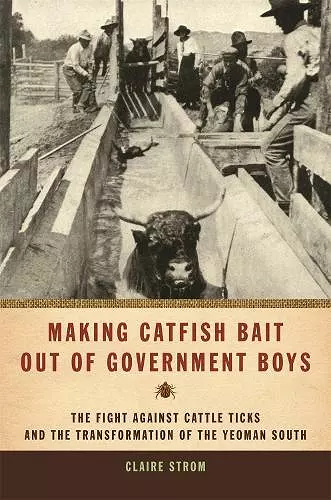Making Catfish Bait out of Government Boys
The Fight against Cattle Ticks and the Transformation of the Yeoman South
Format:Hardback
Publisher:University of Georgia Press
Published:1st Aug '09
Currently unavailable, currently targeted to be due back around 24th January 2025, but could change

This first full-length study of the cattle tick eradication program in the United States offers a new perspective on the fate of the yeomanry in the twentieth-century South during a period when state and federal governments were both increasing and centralizing their authority. As Claire Strom relates the power struggles that complicated efforts to wipe out the Boophilus tick, she explains the motivations and concerns of each group involved, including large- and small-scale cattle farmers, scientists, and officials at all levels of government.
In the remote rural South—such as the piney woods of south Georgia and north Florida—resistance to mandatory treatment of cattle was unusually strong and sometimes violent. Cattle often ranged free, and their owners raised them mostly for local use rather than faraway markets. Cattle farmers in such areas, shows Strom, perceived a double threat in tick eradication mandates. In addition to their added costs, eradication schemes, with their top-down imposition of government expertise, were anathema to the yeomanry’s notions of liberty.
Strom contextualizes her southern focus within the national scale of the cattle industry, discussing, for instance, the contentious place of cattle drives in American agricultural history. Because Mexico was the primary source of potential tick reinfestation, Strom examines the political and environmental history of the Rio Grande, giving the book a transnational perspective. Debates about the political and economic culture of small farmers have tended to focus on earlier periods in American history. Here Strom shows that pockets of yeoman culture survived into the twentieth century and that these communities had the power to block (if only temporarily) the expansion of the American state.
Strom gives the reader a look, literally, through an enormous microscope and then slowly pulls back the lens. . . . This creative organization is one of the book's strengths because it connects the environment, people, and politics in a way that many environmental histories claim to do, but few actually accomplish.
Historians interested in environmental history and the new South will find the well-researched Making Catfish Bait out of Government Boys an important addition to the historiography. Despite the complicated science involved in tick eradication the work is accessible and timely, especially considering the issues surrounding the proper extent of federal power. The narrative, with plenty of shotgun blasts and dynamite explosions alongside helpful maps, makes this work an engaging and worthwhile read.
Extends the story of southern yeomen well into the twentieth century and uses the tick eradication issue as a window into their changing world. Anyone interested in the changing landscape of the American South will want to read Strom's fine and engaging book.
* author of Plain Folk's Fight: The Civil War and Reconstruction in Piney Woods Georgia *Raises important new questions about the unusual role that yeomen played in the modernization of American agriculture. Strom offers intriguing insights into the problematic nature of technological and scientific change: while such change might 'lift all boats' in the abstract and long term, in the short term many supposed beneficiaries paid a steep price. She does a great job of telling that side of the story and of showing how resistance to new ideas and practices also helps shape their ultimate form and impact.
* author of Every Farm a Factory: The Industrial Ideal in American Agriculture *Claire Strom has woven together a wonderful tale of protozoa, insects, cattle, farmers, bureaucrats, politics, and geography revolving around the New South initiative to eradicate tick-borne Texas fever (babesiosis), the range of which roughly matched the contours of the South. This is a wide-ranging monograph in both topical and spatial terms, but Strom neatly ties everything together by using the southern yeoman farmer as the lens through which to view southern development.
Making Catfish Bait out of Government Boys makes an important contribution to the agricultural, political, and cultural history of the South.
ISBN: 9780820327495
Dimensions: 229mm x 152mm x 22mm
Weight: 567g
320 pages